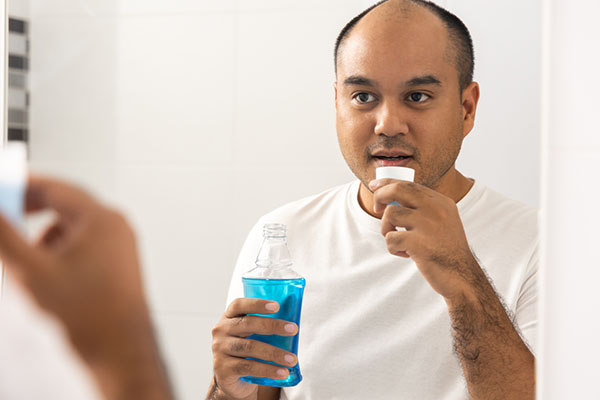 Brushing and flossing your teeth daily are oral hygiene basics, but what about using mouthwash? Is it an essential part of keeping your teeth healthy.
Brushing and flossing your teeth daily are oral hygiene basics, but what about using mouthwash? Is it an essential part of keeping your teeth healthy.
Except for fluoride rinses, mouthwashes are generally not part of the daily oral care routine recommended by dentists, but that does not mean it has no value. Using mouthwash correctly can offer several benefits.
Fights bacteria
One of the most important oral hygiene basics is removing bacteria that cause gum disease and cavities. Most mouthwash is antimicrobial, which means it kills bacteria. To use mouthwash, you take a small amount and swish it around your mouth vigorously for at least 30 seconds. Then, you spit it into the sink and rinse out your mouth with water. Make sure you do not swallow mouthwash, as it is not meant to be ingested.
Helps with bad breath
Bacteria is often the source of the odor, so anything that kills bacteria may help with bad breath. If you have good oral hygiene but still have bad breath from time to time, mouthwash can help.
Additionally, many brands have "fresh" scents such as peppermint and spearmint to give your breath a boost after a strongly flavored lunch. However, you should look out for mouthwash that only covers up odors, but does not address the underlying issues. Make sure you check the ingredients before purchasing.
Flushes away loose food and bacteria
Dentists recommend flossing to loosen food trapped between teeth, then brushing to catch the debris. However, brushing may miss tiny bits of food that catch on gums. Doing a thorough rinse with mouthwash ensures you get any remaining food particles and bacteria.
Strengthens teeth
Some mouthwash contains fluoride, which is a chemical compound that strengthens enamel. In fact, it is often added to drinking water to prevent cavities. If you are genetically predisposed to developing cavities, rinsing with fluoride-infused mouthwash may be an excellent preventative measure.
Can irritate your mouth
The one downside to using mouthwash is that some brands contain ingredients that can irritate the sensitive skin in your mouth. Even mouthwash that does not contain alcohol can cause discomfort in certain situations.
Canker sores
Canker sores are small lesions that appear in the mouth. They are common and usually go away on their own. However, certain mouthwashes may contain ingredients that can irritate them. If you have a canker sore, you may want to skip the rinse until it is healed.
Dehydration
Some mouthwash ingredients are dehydrating, so your mouth may feel dry after rinsing. This dryness does not bother some people, but if you are prone to dry mouth or are on medication that lists dry mouth as one of its side effects, the dehydration may be more noticeable.
Conclusion
Overall, mouthwash can be a great addition to oral hygiene basics. However, it is essential to remember that rinsing does not replace regular oral care as recommended by dentists. Instead, it is an additional step that you can take to support the pillars of brushing and flossing.
Request an appointment or call Gledhill Dental at 509-800-8410 for an appointment in our Kennewick office.
Related Posts
Implant supported dentures combine traditional dentures with permanent dental implants to provide a stable and secure tooth restoration option. Unlike traditional removable dentures, this option is supported by two or more dental implants rather than your gum tissues. The additional stability of dental implants may make it simpler to bite and chew meals, particularly with…
Having a solid handle on good oral hygiene basics will help preserve the integrity of your teeth and mouth health for a long time to come. Steering clear of cavities, receding gums, or decay ensures that your smile is bright and beautiful for as long as possible. If you think you already have an excellent…
Having a firm understanding of oral hygiene basics can prevent tooth decay, gum disease, and general oral discomfort. Human beings go through life developing a range of habits that impact oral health, some of which are good and some of which are bad. Avoiding these damaging behaviors promotes strong teeth and gums that can last…


